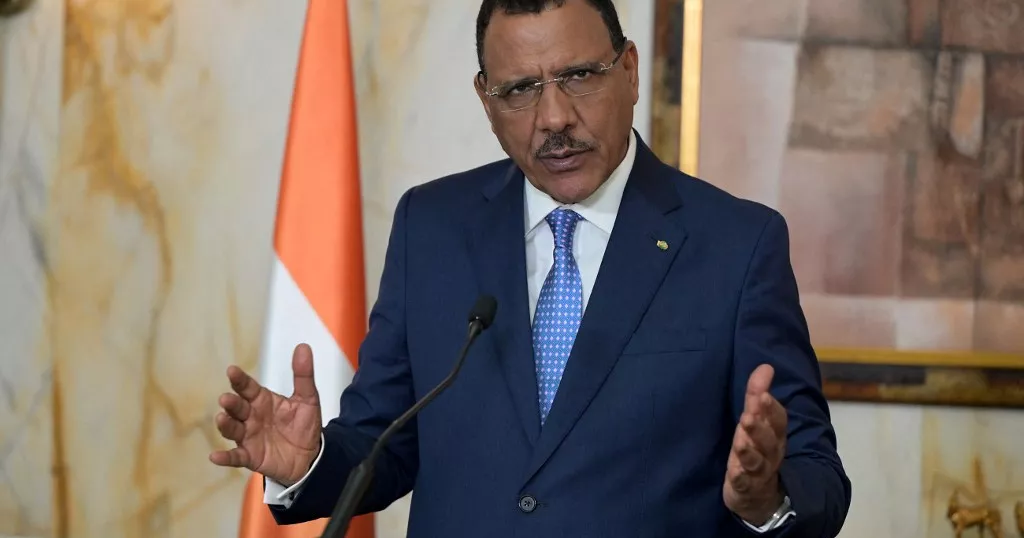Ousted Niger President Struggles For Food Amid 2-Week House Arrest After Coup
Ousted Niger president struggles for food amid 2-week house arrest after coup. The U.S. State Department has expressed deep concern about the deteriorating conditions of his detention.
Author:Suleman ShahReviewer:Han JuAug 10, 20237.9K Shares248.1K Views

Ousted Niger president struggles for food amid 2-week house arrest after coup. The U.S. State Department has expressed deep concern about the deteriorating conditions of his detention.
Crisis Deepens For Ousted President
President Mohamed Bazoum, the democratically elected leader of Niger, has been held under house arrest at the presidential palace in Niamey along with his wife and son since the military coup on July 26.
The family is reportedly enduring dire conditions, living without electricity and having only rice and canned goods for sustenance.
Despite the challenging circumstances, Bazoum remains in good healthand is resolute in not resigning, according to an adviser.
The adviser, who spoke anonymously due to the sensitivity of the situation, also revealed that the president's family is without running water.
International Concern Grows

Niger coup: Citizens demand financial stability, security 2 weeks after takeover
The international community is expressing growing concern about Bazoum's detention.
The U.S. Secretary of State, Antony Blinken, recently spoke with Bazoum and emphasized the importance of the safety and security of the president and his family.
The U.S. State Department released a statement calling for their immediate release.
“„The establishment of a government is significant and signals, at least to the population, that they have a plan in place, with support from across the government.- Aneliese Bernard, a former State Department official
The crisis has also prompted Niger's new military junta to entrench its power, rejecting international mediation efforts. The junta accused France of attempting to destabilize the country, a claim that France has denied.
Crisis Unfolds As Political Struggles Emerge
The coup has thrown Niger into turmoil, with the military junta refusing to reinstate Bazoum despite threats of military intervention from the Economic Community of West African States (ECOWAS).
The junta has appointed a new prime minister, Ali Mahaman Lamine Zeine, and has rejected mediation from various international bodies.
Analysts believe the coup is a result of a power struggle between Bazoum and the head of his presidential guard, General Abdourahmane Tchiani, who now claims to be in charge of the country.
As the political crisis continues, Niger's population of 25 million people is bearing the brunt of the turmoil.
The country, one of the poorest in the world, is facing rising food prices due to economic and travel sanctions imposed by ECOWAS.
Traders report food prices increasing by up to 5%, exacerbating the challenges faced by ordinary citizens.
“„I think the U.S would come to a modus vivendi with this junta, if the junta proved particularly amenable to U.S interests, but that doesn’t seem to be on the table for now.- Alexander Thurston, an assistant professor of political science at the University of Cincinnati
The junta's actions, including shutting down Niger's airspace and suspending diplomatic flights, are adding to the difficulties faced by the population.
International Efforts And Divisions
Efforts to resolve the crisis are facing challenges due to divisions among neighboring African nations. Mali and Burkina Faso, both under military regimes, have sided with the junta and warned against international intervention.
The longer the crisis persists, the more entrenched the junta's position becomes, leading to concerns about the momentum to resolve the situation.
While international figures like Acting U.S. Deputy Secretary of State Victoria Nuland have engaged with the junta, finding a coordinated solution remains a challenge, with some experts worrying about the lack of coordination undermining efforts.
As the crisis unfolds, the fate of Niger's political landscape and its impact on the region remain uncertain.
Final Words
Niger's political crisis deepens as President Mohamed Bazoum remains under house arrest following a military coup.
Despite international concern and mediation efforts, the junta shows resistance, leaving the country's political future uncertain.
The struggle between the junta, international mediators, and divisions among neighboring African nations adds complexity to resolving the crisis.
The people of Niger are bearing the brunt of the turmoil, facing rising food prices and hardships.
As the situation continues, the fate of Niger's political landscape and its repercussions for the region remain uncertain, highlighting the urgency for a coordinated resolution.

Suleman Shah
Author
Suleman Shah is a researcher and freelance writer. As a researcher, he has worked with MNS University of Agriculture, Multan (Pakistan) and Texas A & M University (USA). He regularly writes science articles and blogs for science news website immersse.com and open access publishers OA Publishing London and Scientific Times. He loves to keep himself updated on scientific developments and convert these developments into everyday language to update the readers about the developments in the scientific era. His primary research focus is Plant sciences, and he contributed to this field by publishing his research in scientific journals and presenting his work at many Conferences.
Shah graduated from the University of Agriculture Faisalabad (Pakistan) and started his professional carrier with Jaffer Agro Services and later with the Agriculture Department of the Government of Pakistan. His research interest compelled and attracted him to proceed with his carrier in Plant sciences research. So, he started his Ph.D. in Soil Science at MNS University of Agriculture Multan (Pakistan). Later, he started working as a visiting scholar with Texas A&M University (USA).
Shah’s experience with big Open Excess publishers like Springers, Frontiers, MDPI, etc., testified to his belief in Open Access as a barrier-removing mechanism between researchers and the readers of their research. Shah believes that Open Access is revolutionizing the publication process and benefitting research in all fields.

Han Ju
Reviewer
Hello! I'm Han Ju, the heart behind World Wide Journals. My life is a unique tapestry woven from the threads of news, spirituality, and science, enriched by melodies from my guitar. Raised amidst tales of the ancient and the arcane, I developed a keen eye for the stories that truly matter. Through my work, I seek to bridge the seen with the unseen, marrying the rigor of science with the depth of spirituality.
Each article at World Wide Journals is a piece of this ongoing quest, blending analysis with personal reflection. Whether exploring quantum frontiers or strumming chords under the stars, my aim is to inspire and provoke thought, inviting you into a world where every discovery is a note in the grand symphony of existence.
Welcome aboard this journey of insight and exploration, where curiosity leads and music guides.
Latest Articles
Popular Articles